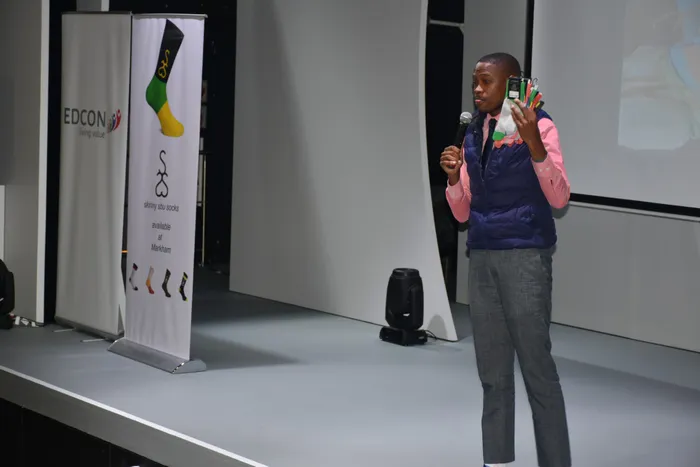The 'Mob of Public Opinion' in the Age of Entrepreneurship - 22 On Sloane
OPINION

Entrepreneur, Sibusiso Ngwenya of Skinny Sbu Socks.
Image: File
I woke up one morning, did my usual doomscroll on X (previously known as Twitter, back when things made sense), and there it was – another empire burning down in real time
This time, it wasn’t a washed-up actor making a last-ditch attempt at relevance. No, this was different.
This was the Skinny Sbu guy. The man who turned colourful, overpriced foot fabric into a national phenomenon was now the main character on the timeline - and not in a good way. Sibusiso Ngwenya made public appeals for a R5 million cash injection to revive his business, stating, "I don't need advice, I need money!"
His blatant approach sparked significant debate on social media platforms. Many users criticised his perceived sense of entitlement (I mean, honestly, though). And of course, this wasn’t the first time we had seen a meteoric rise crash into the unforgiving wall of public opinion.
Kanye West, once a god-tier creative, has turned his own legacy into a smoking pile of controversy by running his mouth one too many times. His words got him into trouble, and when Adidas ended their partnership with him in 2022, it wasn’t just a PR fallout - it was a financial setback that reshaped his Yeezy empire almost overnight.
In today’s digital age, a single misstep can lead to swift and severe repercussions for entrepreneurs. The rise of social media has given consumers unprecedented power to voice their opinions, but this has led to a culture where companies find themselves increasingly vulnerable to the whims of public sentiment.
This phenomenon, often referred to as "digital mobbing," illustrates the double-edged sword that is social media; while it offers a platform for engagement, it simultaneously exposes brands to swift condemnation. Social media has turned into a colosseum where we cheer for creators until the moment we’re handed a pitchfork.
So, as I sat there, sipping my coffee and watching the downfall of Skinny Sbu unfold in real time, I couldn’t help but wonder: what’s the expiration date on public success before Twitter decides you need to be taken down and what steps could entrepreneurs take to curb this impending fate?
For businesses navigating the volatile digital landscape, the key lies in strategic social media management and proactive crisis planning. Research suggests that organisations should implement clear social media policies, train employees on ethical engagement, and prioritise transparency in communication.
A 2015 study by Dijkmans highlights how companies that actively manage their online reputation and foster genuine consumer relationships are more likely to withstand public scrutiny.
At its best, social media is a powerful tool for brand-building and consumer connection. At its worst, it’s an unpredictable minefield. Understanding this digital landscape involves recognising the rapid nature of information dissemination and the accompanying expectations from consumers.
For businesses aiming to build a resilient reputation in this volatile environment, a focused approach to social media management - balancing responsiveness with ethical considerations - will be crucial for sustaining long-term consumer trust and loyalty.

Boitshoko Shoke is the research and impact manager of 22 On Sloane, Africa’s largest entrepreneurship campus. Photo: Supplied
Image: Supplied
Boitshoko Shoke, Research & Impact Manager at 22 On Sloane.
*** The views expressed here do not necessarily represent those of Independent Media or IOL.
BUSINESS REPORT
Related Topics: